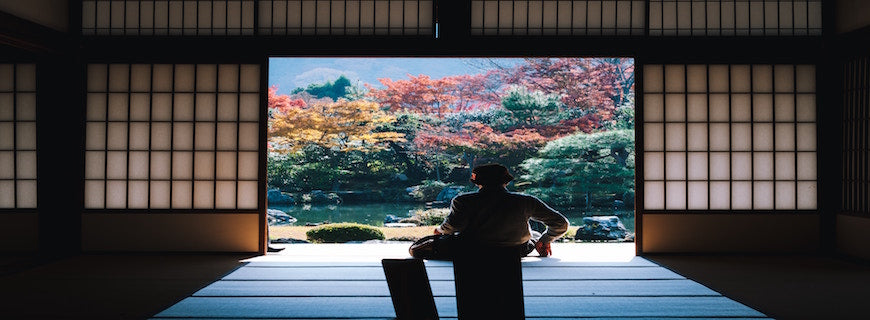The international bestseller Ikigai: The Japanese Secret to a Long and Happy Life, by Héctor García and Francesc Miralles, is a meditative antidote to anyone who has ever found themselves saying “I don’t know what to do with my life.”
Indeed, García dedicates the book to his brother Aitor, whom he tells us has made such a remark on multiple occasions. Ikigai has resonated with readers precisely because of the logotherapeutic lessons it dispenses: lessons on how to live longer and better by finding your purpose. Lessons on how to stay young while growing old.
We cannot recommend the book highly enough, so please get yourself a copy. But before you do, read on to find out about ten short rules of Ikigai outlined in the book’s epilogue. Can following these guidelines help you achieve more meaning and fulfilment?
What is Ikigai?
First, let’s start with a definition of Ikigai. Ikigai is a Japanese concept that means “reason for being”. It is the heart of things, the motivation at the centre of our existence: the source of value in a person’s life or the things that makes them put one foot in front of the other each day.
As described in the book’s introduction, a deep connection with, and appreciation for, Ikigai is one probable reason for the remarkable longevity of the Japanese, particularly those residing on Okinawa. Here, there are 24.55 people over the age of 100 for every 100,000 inhabitants: far more than the worldwide average.
The authors speculate that there are many factors which might collude to explain Okinawa’s disproportionate populace of centenarians: their uncommon sense of community, a non-exclusionary sense of oneness wherein even strangers are treated like brothers; access to lush hills and crystalline waters; Moringa tea; a light, nutritious diet and moderate exercise, even after retirement.
So why do you get up in the morning? Do you know the answer or are you still pondering the question? And what can you learn from the Japanese philosophy on health, longevity and meaning?
Ten Rules of Ikigai
While it is easy to say that Japanese longevity owes much to culture, and in this way abdicate any responsibility for improving our own chances of emulating their defiant centenarians, there are many things we can learn from them in order to reduce our chances of chronic illness, enjoy high levels of vitality throughout life and particularly in our senior years, and infuse our days with a genuine sense of purpose.
Here are ten lessons of Ikigai, as outlined in the final two pages of the book.
1) Stay active; don’t retire.
“Those who give up on the things they love doing and do well lose their purpose in life. That’s why it’s so important to keep doing things of value, making progress, bringing beauty or utility to others, helping out, and shaping the world around you, even after your ‘official’ professional activity has ended.”
We love this lesson. While many of us can’t wait to retire and relax, the truth is that a void or chasm can open up inside us after we lose our sense of purpose.
Of course, if you are stuck in a job you despise, this might not be the case: but in this circumstance, you should do everything possible to find a vocation that inspires you. Don’t wait until retirement to do what you want to do.
2) Take it slow.
“Being in a hurry is inversely proportional to quality of life. As the old saying goes, ‘walk slowly and you’ll go far.’ When we leave urgency behind, life and time take on new meaning.”
The logic in this is undeniable. Don’t rush through life: take time to appreciate meaningful moments along the way. Don’t move with languor, progress with patience and a sense of appreciation for the passage of time.
The hyper-focus on productivity might win you a promotion but it probably won’t add years to your life.
3) Don’t fill your stomach.
“Less is more when it comes to eating for long life, too. According to the 80 percent rule, in order to stay healthier longer, we should eat a little less than our hunger demands instead of stuffing ourselves.”
This is not a new concept: decades of lab research on rats shows that calorie restriction can increase lifespan. The results were also replicated in 2017 on rhesus monkeys, primates with notably human-like ageing patterns.
Rozalyn Anderson, a researcher in the latter study, suggests that adhering to such a self-imposed rule – namely eating 30% less calories – “delays aging and vulnerability. Instead of going after diseases one at a time, you go after the underlying vulnerability and tackle them all at once.”
Incidentally, a separate study conducted by the University of Southern California showed that anti-ageing benefits could be obtained by practising a fast-mimicking diet intermittently, which provides a ‘regenerative’ effect: with this method you would observe calorie-control five days a month for three consecutive months, and then repeat the protocol at intervals as required.
If your daily maintenance calorie intake is 2,000 kcals, you would eat perhaps 1,300 from Monday to Friday on Week 1 in January, February and March; then perhaps again in Week 1 in August, September and October.
4) Surround yourself with good friends.
“Friends are the best medicine, there for confiding worries over a good chat, sharing stories that brighten your day, getting advice, having fun, dreaming… in other words, living.”
No dispute here: we are evolutionarily programmed to treasure company and respond favourably to a sense of community. Continuous social interaction is vital for physical and mental health, as research has shown time and time again.
5) Get in shape for your next birthday.
“Water moves; it is at its best when it flows fresh and doesn’t stagnate. The body you move through life in needs a bit of daily maintenance to keep it running for a long time. Plus, exercise releases hormones that make us feel happy.”
Accepting that your body simply goes to seed when you get older might seem normal, but it isn’t: the body was designed to move, right through life. If you’re currently out of shape, make a pledge to get fit this year. Lifelong exercise routines positively influence your performance later in life.
6) Smile.
“A cheerful attitude is not only relaxing – it also helps make friends. It’s good to recognize that things aren’t so great, but we should never forget what a privilege it is to be in the here and now in a world so full of possibilities.”
You might not immediately appreciate the connection between something so simple as smiling and good health or longevity. But smiling lifts your mood by releasing endorphins, and positively affects those around you. It helps retune to your attitude and puts you on a more optimistic footing.
Smiling could even boost your immune health, due to the connection between neurotransmitters and the gut.
7) Reconnect with nature.
“Though most people live in cities these days, human beings are made to be part of the natural world. We should return to it often to recharge our batteries.”
This simply feels right, doesn’t it? Of course, science backs it up too. In a 2016 study of 108,000 women, those living in the greenest areas had a 12% lower risk of death than those living in the least green areas.
Broken down by disease risk, females in greener locales benefitted from a 41% lower death rate for kidney disease, a 34% lower mortality rate for respiratory disease and a 13% lower death rate for cancer.
Okinawans are of course known to garden well into their senior years, as are residents of other long-living regions such as Icaria in Greece, Sardinia in Italy and Nicoya in Costa Rica.
This has the dual benefit of encouraging time outdoors in green spaces and moderate physical activity. What’s more, men and women who regularly garden in later life are said to have a 36% lower risk of dementia than non-gardening counterparts.
8) Give thanks.
“To your ancestors, to nature, which provides you with the air you breathe and the food you eat, to your friends and family, to everything that brightens your days and makes you feel lucky to be alive. Spend a moment every day giving thanks, and you’ll watch your stockpile of happiness grow.”
Gratitude can centre you and bring inner peace: you start to appreciate all that you have and disregard all that you do not. Cultivate a habit of expressing gratitude often, and let your woes drift away on the ether. It is a tremendously empowering exercise.
9) Live in the moment.
“Stop regretting the past and fearing the future. Today is all you have. Make the most of it. Make it worth remembering.”
Prolonged resentment eats away at the spirit and eventually eats away at the body, often manifesting in excess acidity and inflammation. Don’t be defined by your past, focus on the here and now!
10) Follow your ikigai.
“There is a passion inside you, a unique talent that gives meaning to your days and drives you to share the best of yourself until the very end. If you don’t know what your ikigai is yet, as Viktor Frankl says, your mission is to discover it.”
Do it!
Conclusion
Ikigai: The Japanese Secret to a Long and Happy Life is a joy to read, and hopefully these excerpts will compel you to grab your very own copy and start incorporating some of its actionable lessons into your own life.
The bestseller is packed full of wisdom and includes chapters on exercises from the East to promote health, tips for coping with stress and worry, information about the nutrition of the world’s longest-living people and traditions and proverbs for a longer life.
There is much we can learn from the longest-living people walking the Earth, but there is much we can learn, too, from looking inside ourself, as well as out there at the world, and finding our true purpose.




























Leave a comment